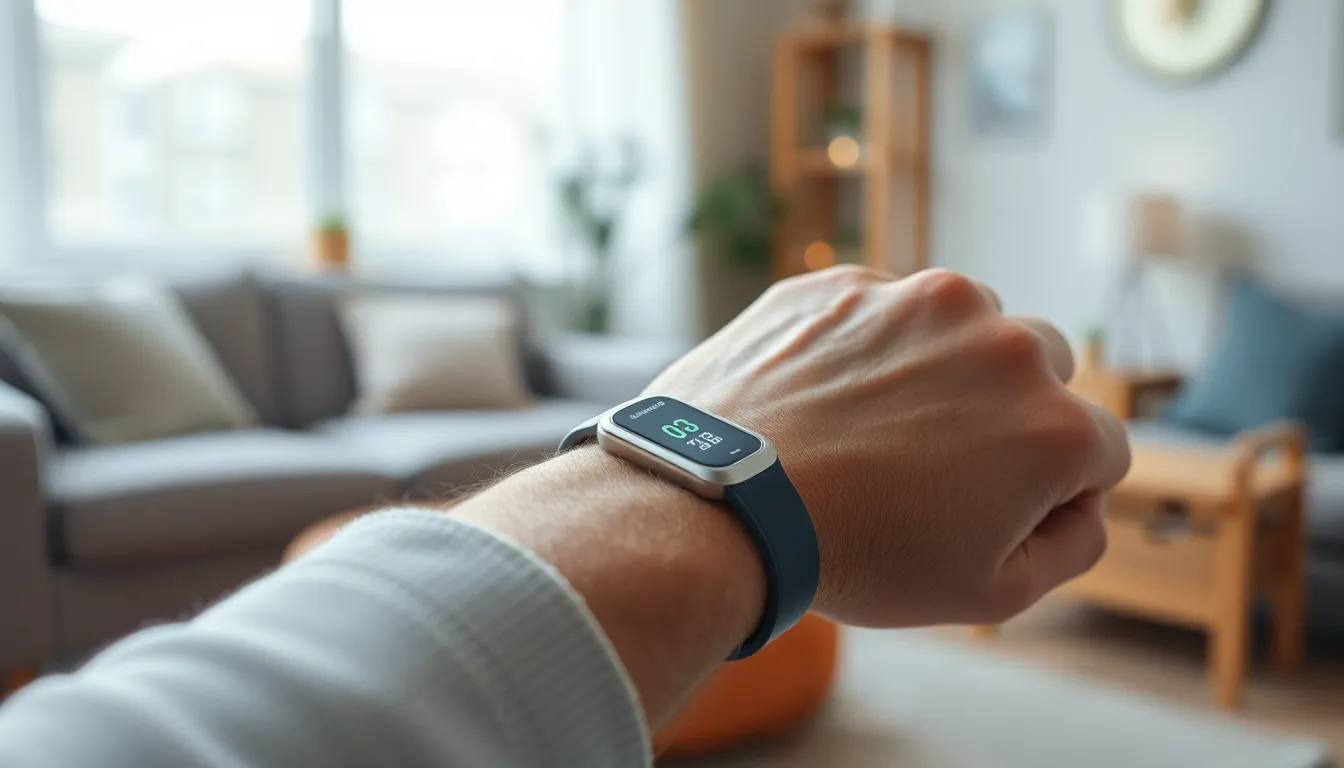As dementia continues to affect millions of individuals and their families, finding innovative solutions for safety and care becomes increasingly important. Non-removable tracking bracelets have emerged as a vital tool in this realm, offering peace of mind to caregivers and loved ones. These discreet devices not only help monitor the whereabouts of dementia patients but also promote independence and dignity.
With advancements in technology, these bracelets provide real-time location tracking, ensuring that individuals can be quickly located if they wander. This innovation addresses a common concern among families, allowing them to focus on quality time rather than constant worry. Understanding the benefits and features of non-removable tracking bracelets can empower caregivers to make informed decisions for their loved ones.
Table of Contents
ToggleOverview Of Non Removable Tracking Bracelets
Non-removable tracking bracelets offer essential solutions for the safety of dementia patients. These devices ensure caregivers can monitor location effectively while fostering patients’ independence.
Importance Of Tracking For Dementia Patients
Tracking serves a crucial role in managing dementia. It provides peace of mind for families concerned about wandering, which impacts nearly 60% of dementia patients at some point. GPS-enabled bracelets help locate individuals quickly, reducing stress for caregivers and enhancing safety. Real-time updates on location empower caregivers to act swiftly, preventing potential dangers associated with disorientation and wandering.
Key Features To Consider
When selecting a non-removable tracking bracelet, several key features enhance functionality:
- GPS Accuracy: High-precision GPS technology ensures reliable location tracking, often accurate within a few meters.
- Real-Time Alerts: Immediate notifications inform caregivers of any unusual movements or deviations from pre-set safe zones.
- Durability: Bracelets must withstand everyday wear, so robust materials and water resistance are vital.
- Battery Life: Extended battery life guarantees continuous operation, with some devices lasting up to several weeks on a single charge.
- Comfort: An ergonomic design ensures comfort for daily wear, encouraging patients to keep the bracelet on.
- Caregiver Access: User-friendly apps allow caregivers to access location data and history with ease, providing convenience and usability.
- Non-Removable Design: Ensuring the bracelet remains securely attached prevents patients from removing it themselves, crucial for their safety.
Selecting a bracelet with these features promotes safety and simplifies caregiving for dementia patients.
Benefits Of Non Removable Tracking Bracelets

Non-removable tracking bracelets offer significant advantages for dementia patients and their caregivers. These devices enhance safety and deliver peace of mind, crucial elements for managing this condition.
Enhanced Safety For Patients
Enhanced safety is a primary benefit of non-removable tracking bracelets. These devices provide continuous GPS location tracking, enabling caregivers to locate patients instantly. In emergencies, such as wandering episodes, the ability to respond quickly reduces risks associated with disorientation. Additionally, non-removable features prevent patients from easily removing the bracelet, ensuring consistent monitoring. The integration of alerts for deviations from established safe zones further enhances patient protection, supporting timely interventions.
Peace Of Mind For Caregivers
Peace of mind for caregivers is another vital benefit of non-removable tracking bracelets. These devices alleviate the constant worry associated with the potential for wandering, a common concern among families. Caregivers can monitor locations in real-time through smartphone apps or connected devices, reinforcing their ability to keep loved ones safe while allowing them some independence. Knowing that a reliable tracking solution is in place empowers caregivers to focus on quality interactions with patients, fostering a supportive and caring environment.
Types Of Non Removable Tracking Bracelets
Various types of non-removable tracking bracelets cater to the unique needs of dementia patients, ensuring safety and aiding caregivers. The primary types include GPS tracking bracelets and RFID tracking bracelets.
GPS Tracking Bracelets
GPS tracking bracelets utilize Global Positioning System technology for real-time location monitoring. These devices provide accurate positioning, allowing caregivers to track patients 24/7. GPS tracking bracelets often feature geofencing capabilities, notifying caregivers when patients venture beyond designated safe zones. With a rechargeable battery life ranging from several days to weeks, these bracelets ensure continuous operation, promoting safety without frequent downtime.
Examples of GPS tracking bracelets include those manufactured by AngelSense and Garmin, which offer user-friendly interfaces and integration with mobile apps for easy monitoring. Families benefit from instant alerts and the ability to locate loved ones immediately, enhancing peace of mind.
RFID Tracking Bracelets
RFID tracking bracelets employ Radio Frequency Identification technology for location tracking within a limited range. These devices rely on RFID tags, which emit signals to nearby readers. RFID tracking bracelets provide security in specific environments, such as nursing homes or assisted living facilities, enabling staff to monitor patients’ movements within premises.
The non-removable design of RFID tracking bracelets ensures that patients cannot easily remove them, enhancing their effectiveness. While RFID tracking may not offer the extensive coverage of GPS systems, the enhanced safety within controlled areas remains crucial. Examples include tracking bracelets from Secure Care Products, which focus on patient safety in healthcare settings.
Each type presents specific advantages for different monitoring scenarios, providing flexible solutions for caregivers of dementia patients.
Challenges And Considerations
Non-removable tracking bracelets for dementia patients present various challenges and considerations that caregivers must evaluate. Understanding these aspects ensures the effective use of technology in promoting patient safety.
Acceptance By Patients
Acceptance by patients remains a crucial factor in the successful use of tracking bracelets. Many patients may resist wearing such devices due to discomfort or feelings of restriction. Caregivers should introduce the bracelet positively, emphasizing its benefits. Strategies to foster acceptance include involving patients in selecting the device and demonstrating how it can enhance their independence. Gradual acclimatization to wearing the bracelet can promote comfort and reduce initial reluctance.
Privacy Concerns
Privacy concerns often arise when implementing tracking technology for dementia patients. Family members and caregivers must balance safety with the individual’s right to privacy. Transparent communication regarding the device’s purpose can help alleviate fears of surveillance. Establishing clear guidelines about data access and sharing will further protect patient privacy. Caregivers should ensure that tracking data is secured and only accessible to authorized users, fostering trust while prioritizing safety.
Non-removable tracking bracelets represent a significant advancement in the care of dementia patients. By combining safety with dignity these devices empower both patients and caregivers. The ability to monitor real-time locations alleviates the stress of wandering while fostering independence.
Caregivers can choose from various options tailored to specific needs ensuring that each device provides essential features for effective monitoring. It’s vital to introduce these tools positively to enhance acceptance and comfort for patients. Open communication about the purpose and benefits of the bracelets helps build trust and encourages cooperation.
As technology continues to evolve the role of tracking devices in dementia care will only grow. Families can find reassurance knowing that innovative solutions are available to support their loved ones while enhancing their quality of life.





